It remains the greatest achievement in England's footballing history.
The Three Lions' sole major championship came back in 1966, when Alf Ramsey, Bobby Charlton and Bobby Moore led their country to a first - and so far only - World Cup.
The tournament on home soil was a landmark moment for the sport in Britain added further fuel to rivalries with Argentina and Germany that have lasted to this day.
More than half a century on, and with England still looking to replicate their greatest day after securing a semi-final spot in this summer's World Cup tournament, Goal looks back on how the national team's greatest glory was achieved.
England's 1966 World Cup squad
| No. | Player | Age | Position | Club |
|---|---|---|---|---|
| 1 | Gordon Banks | 28 | Goalkeeper | Leicester City |
| 2 | George Cohen | 26 | Defender | Fulham |
| 3 | Ray Wilson | 31 | Defender | Everton |
| 4 | Nobby Stiles | 24 | Midfielder | Manchester United |
| 5 | Jack Charlton | 31 | Defender | Leeds United |
| 6 | Bobby Moore | 25 | Defender | West Ham |
| 7 | Alan Ball | 21 | Midfielder | Blackpool |
| 8 | Jimmy Greaves | 26 | Forward | Tottenham |
| 9 | Bobby Charlton | 28 | Midfielder | Manchester United |
| 10 | Geoff Hurst | 24 | Forward | West Ham |
| 11 | John Connelly | 27 | Forward | Manchester United |
| 12 | Ron Springett | 30 | Goalkeeper | Sheffield Wednesday |
| 13 | Peter Bonetti | 24 | Goalkeeper | Chelsea |
| 14 | Jimmy Armfield | 30 | Defender | Blackpool |
| 15 | Gerry Byrne | 27 | Defender | Liverpool |
| 16 | Martin Peters | 22 | Midfielder | West Ham |
| 17 | Ron Flowers | 31 | Defender | Wolves |
| 18 | Norman Hunter | 22 | Defender | Leeds United |
| 19 | Terry Paine | 27 | Forward | Southampton |
| 20 | Ian Callaghan | 24 | Midfielder | Liverpool |
| 21 | Roger Hunt | 27 | Forward | Liverpool |
| 22 | George Eastham | 29 | Midfielder | Arsenal |
England's squad for the World Cup was fairly young, with only four players aged 30 or over.
The Three Lions' defensive unit was built around Gordon Banks in goal and captain Bobby Moore (pictured below), who partnered the experienced Jack Charlton at centre-back.
Ramsey received criticism for selecting Nobby Stiles as a tough-tackling defensive midfielder in an otherwise skilled team, but the Manchester United man would play an integral role in England's run.
He sat at the base of midfield in what would eventually become a 4-1-3-2. Bobby Charlton, who many consider to be the greatest England player of all time, was deployed centrally in the midfield three and slightly more advanced than the two players either side of him.
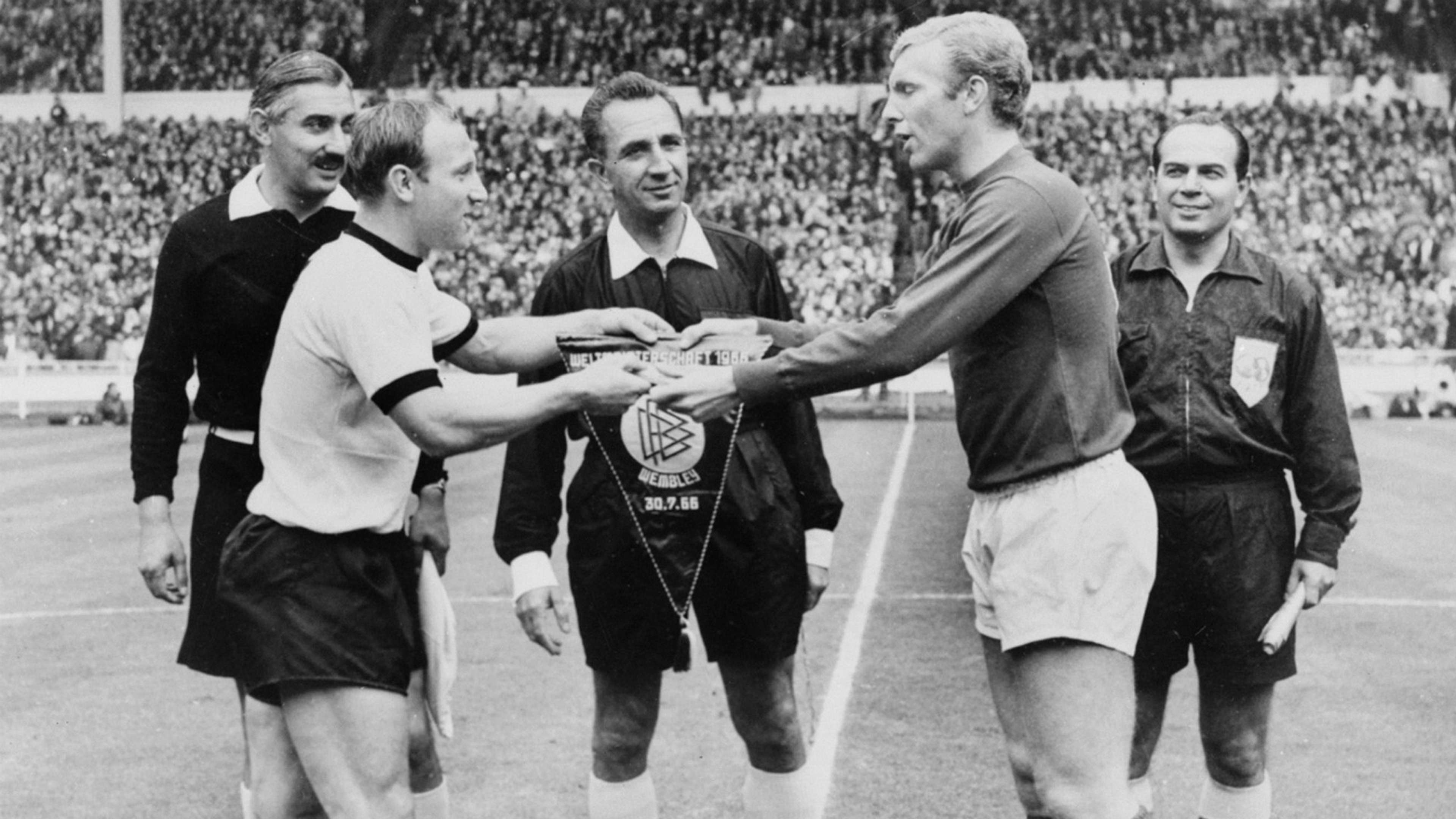
Stiles and Bobby Charlton aside, Ramsey rotated his midfielders and forwards as he settled on a preferred system, with the likes of Ian Callaghan and Jimmy Greaves featuring in the lineup early in the World Cup.
By the knockout stage, though, he had decided to do away with wingers and picked Martin Peters and Alan Ball as the two wider midfielders.
Up front, Ramsey saw talent in the young Geoff Hurst and partnered him with Roger Hunt, despite his relative inexperience.
England manager: Alf Ramsey
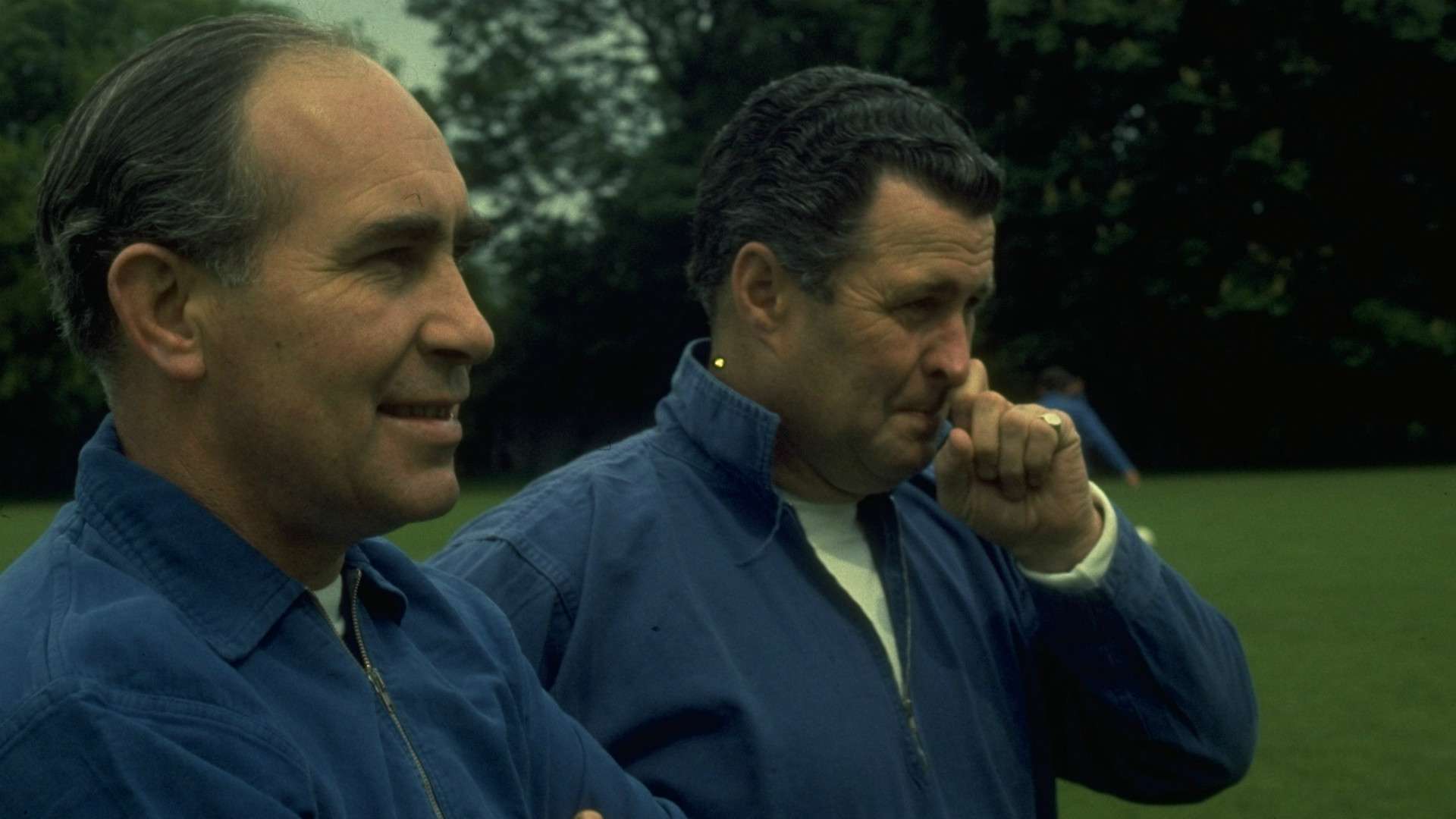 Getty Images
Getty Images
Ramsey (pictured above on the left) had taken charge of England in 1963.
After making over 200 appearances for Tottenham, he made his name as a manager by guiding Ipswich Town from the Third Division to an English championship in the space of seven years.
That earned Ramsey the England job after Walter Winterbottom had resigned following a quarter-final exit at the 1962 World Cup, though he did not officially take over until the end of the 1962-63 club season.
Ramsey was an authoritative figure who was the first England boss to demand full control over which players were selected for the national team.
He also had an appreciation for skilled, intelligent footballers and demonstrated a great deal of tactical acumen to get the best out of the players at his disposal in 1966.
Ramsey is regarded as one the greatest British managers of all time and was the first person to be inducted into the English Football Hall of Fame in 2002.
England's World Cup 1966 group stage
| Date | Match | Scorers |
|---|---|---|
| July 11 | England 0-0 Uruguay | None |
| July 16 | England 2-0 Mexico | B. Charlton, Hunt |
| July 20 | England 2-0 France | Hunt (2) |
England, who played all of their World Cup matches at Wembley, were drawn into a challenging group and started their campaign against Uruguay.
Led by the legendary playmaker Pedro Rocha, Uruguay would win the South American Championship in 1967 and were the only team at the World Cup besides West Germany to hold England to a draw over 90 minutes, with the match ending goalless.
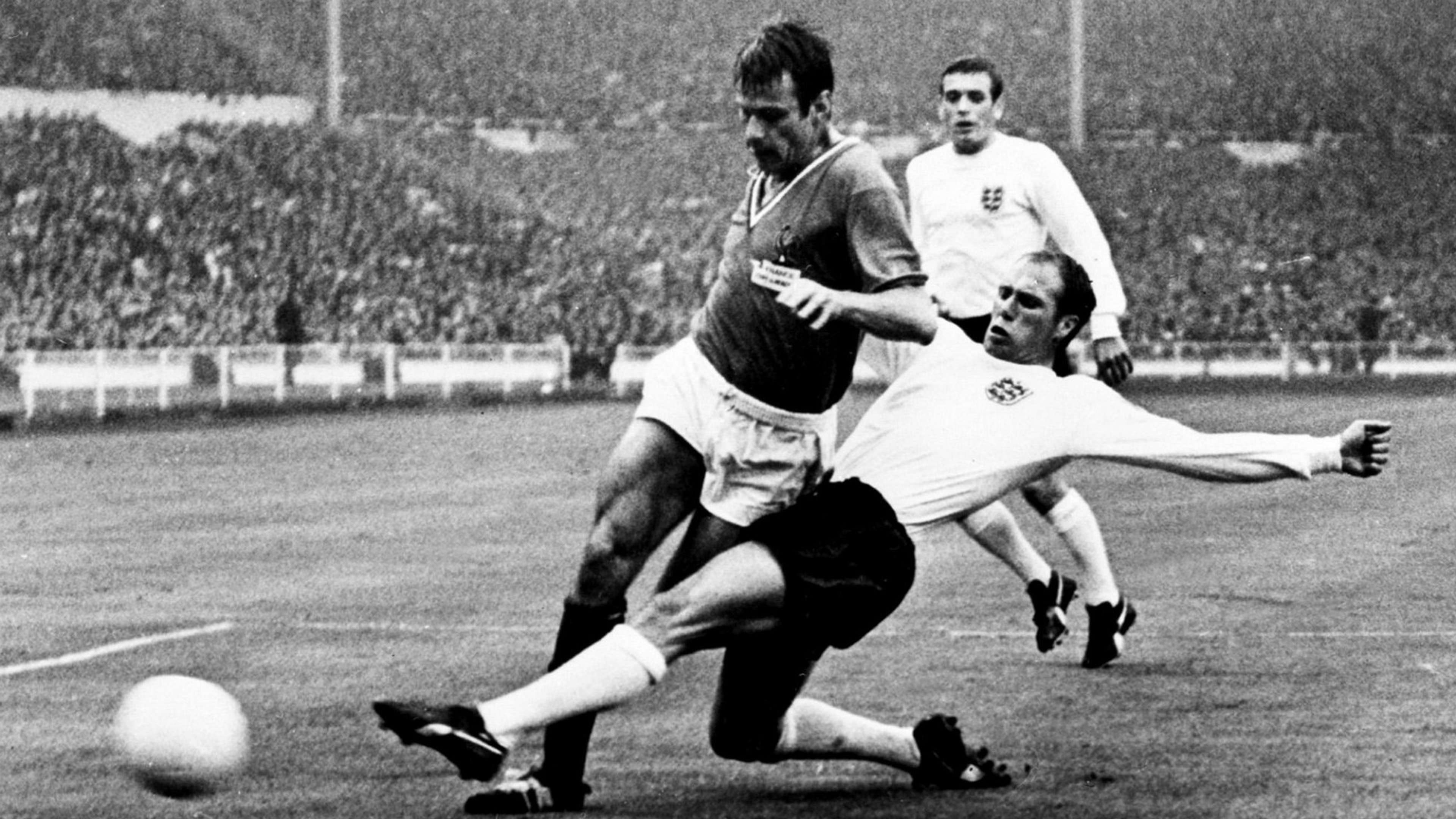
England kicked into life five days later against Mexico, though, with Bobby Charlton and Hunt getting off the mark in a 2-0 victory.
And they saw off France, who were going through a barren period following the retirement of Just Fontaine, by the same scoreline to progress to the knockout stage. Hunt was on target again, bagging both goals.
World Cup 1966 Knockout Stage
| Date | Match | Scorers |
|---|---|---|
| July 23 | England 1-0 Argentina | Hurst |
| July 26 | England 2-1 Portugal | B. Charlton (2) |
The knockout field was strong, though reigning champions Brazil - knocked out by Portugal and Hungary, then an international powerhouse - were a notable absentee.
England took on Argentina in the quarter-finals, while West Germany faced Uruguay and the Soviet Union played Hungary. North Korea, who had stunned Italy in their final group game, were rewarded with a date with Eusebio and Portugal.
England 1-0 Argentina
Hurst gave a hint of what was to come by proving to be England's hero against Argentina, scoring a 78th-minute goal to win the game.
It was a match that marked the start of the fierce rivalry between the two nations. Argentina claimed Hurst's goal was offside, but they were most unhappy about the sending off of their captain, Antonio Rattin, in the first half.
Rattin had been booked for a challenge on Bobby Charlton and then received his marching orders for apparently protesting another foul against Hurst. He was so incensed that he had to be escorted off the pitch by police.
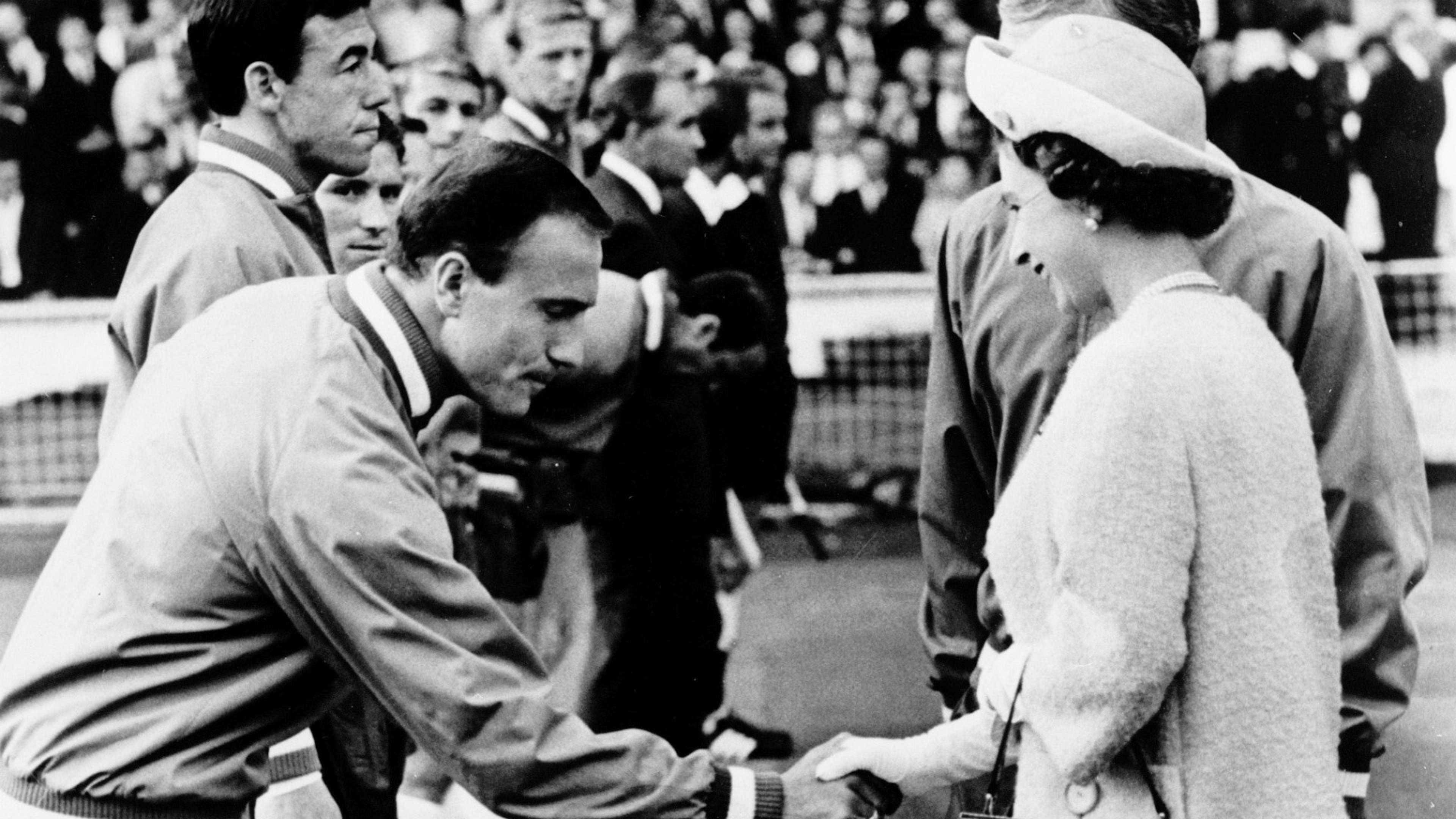
Some in Argentina believed the English and the Germans, through referee Rudolf Kreitlein, had conspired to knock Argentina out. It didn't help that Kreitlein later said he had sent Rattin off because he didn't like how he looked at him and Ramsey labelled the Argentines "animals".
England 2-1 Portugal
If England's quarter-final against Argentina had been mired in controversy, their semi-final against Portugal could not have been more different.
The Three Lions' 2-1 win was celebrated as a magnificent game and the English and Portuguese players lauded for their sportsmanship. "Play as you did against us in the semi-final and the World Cup will be yours on Saturday," Portugal coach Otto Gloria graciously told the host nation.
Bobby Charlton made headlines around the world by outdoing Eusebio, scoring twice before the Benfica star set up a tense finale by netting a late penalty. It was the first goal England had conceded at the World Cup.
West Germany had beaten the Soviet Union by the same scoreline a day earlier and were waiting for England in the final.
World Cup 1966 Final
| Date | Match | Scorers |
|---|---|---|
| July 30 | England 4-2 West Germany (aet) | Hurst (3), Peters |
The most famous day in English football history was also one of the most memorable World Cup finals of all time.
There was enough drama in the 90 minutes alone, with Helmut Haller giving the West Germans the lead and Hurst equalising within the first 20 minutes.
Hurst's West Ham team-mate Peters then appeared to have crowned the Three Lions world champions only for Wolfgang Weber to hit back in the 89th minute and send the game to extra time.
But England did not crumble under the disappointment of conceding in the penultimate minute.
Hurst's winner, scored in the 101st minute, remains controversial to this day. The striker received a cross from Ball and fired a shot past goalkeeper Hans Tilkowski only for the ball to hit the crossbar and bounce down onto the goal line.
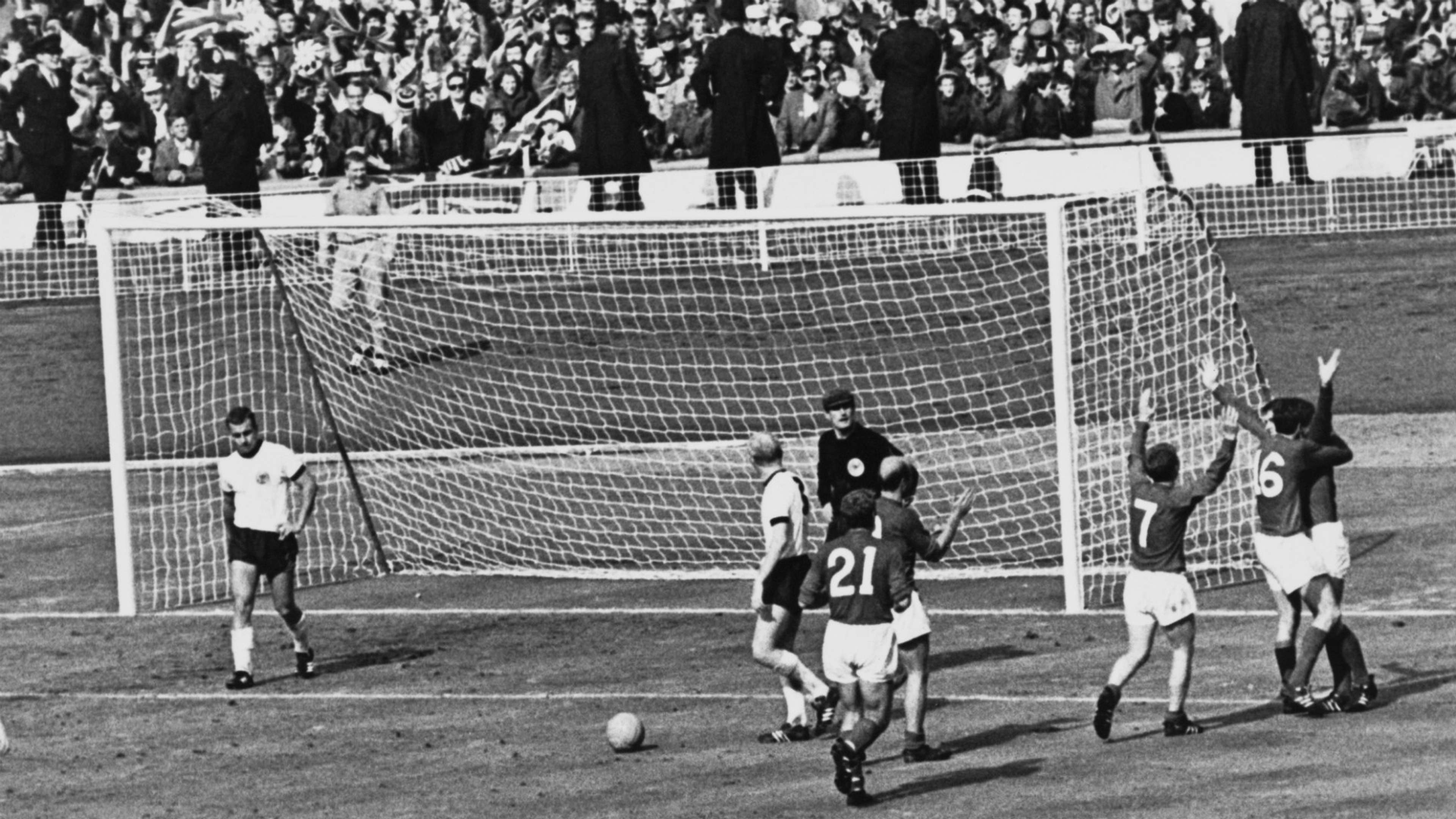
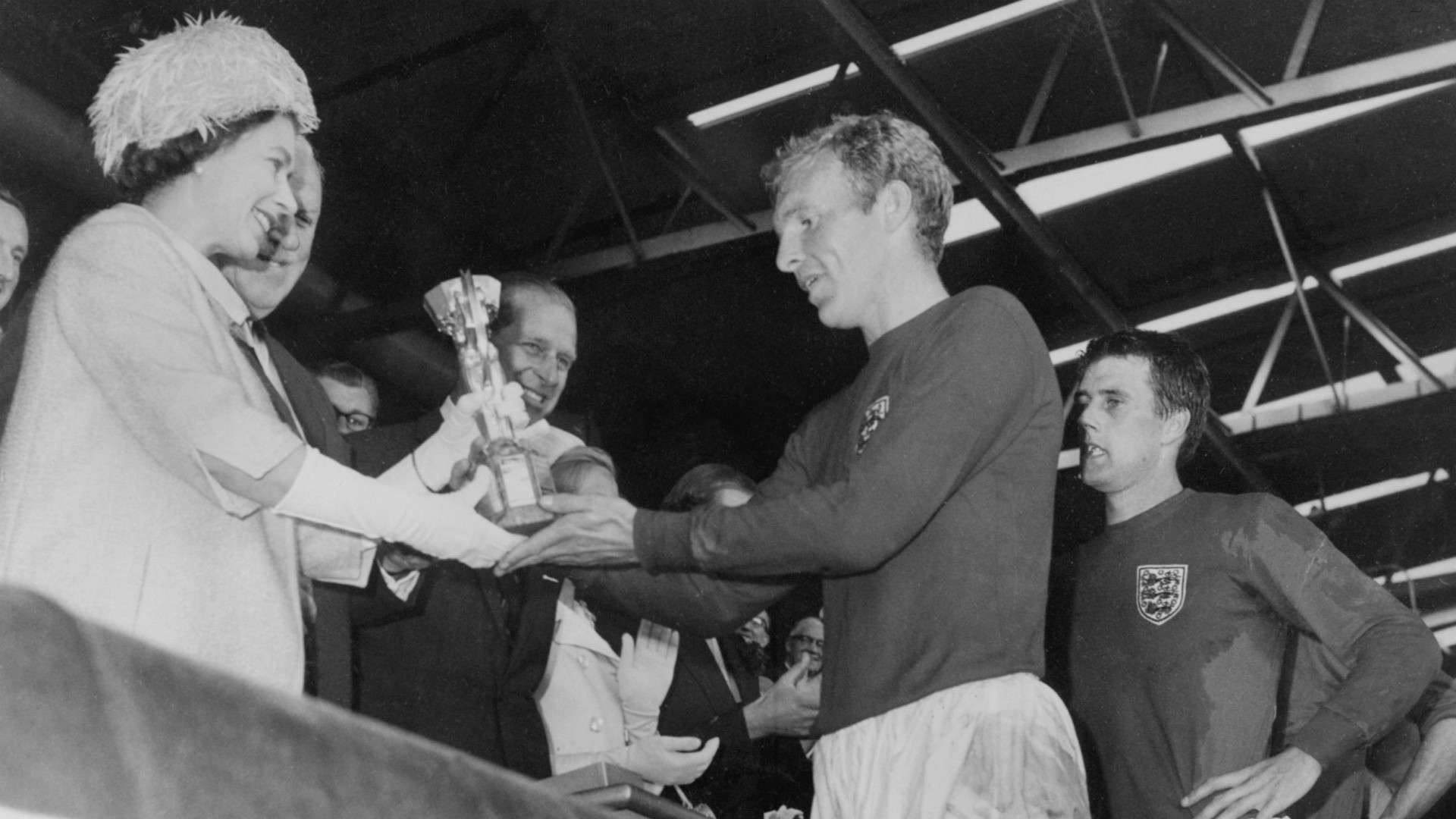
Hunt believed it was in and wheeled away in celebration. The referee, Gottfried Dienst, was not sure and deferred to his assistant, Tofiq Bahramov. In a decision that made him famous, the linesman from Azerbaijan indicated a goal.
The evidence is that the ball probably did not go in. Studies using modern-day technology have indicated that the ball could not have crossed the line while Bahramov later admitted that he thought the shot had rebounded off the back of the net, not the crossbar, making where it landed irrelevant to him at the time.
But it is hard to describe the Germans as being badly robbed given that England had dominated extra time, with Bobby Charlton hitting the post before Hurst struck.
Hurst added a fourth in the dying seconds and commentator Kenneth Wolstenholme famously declared: "They think it's all over! It is now!"
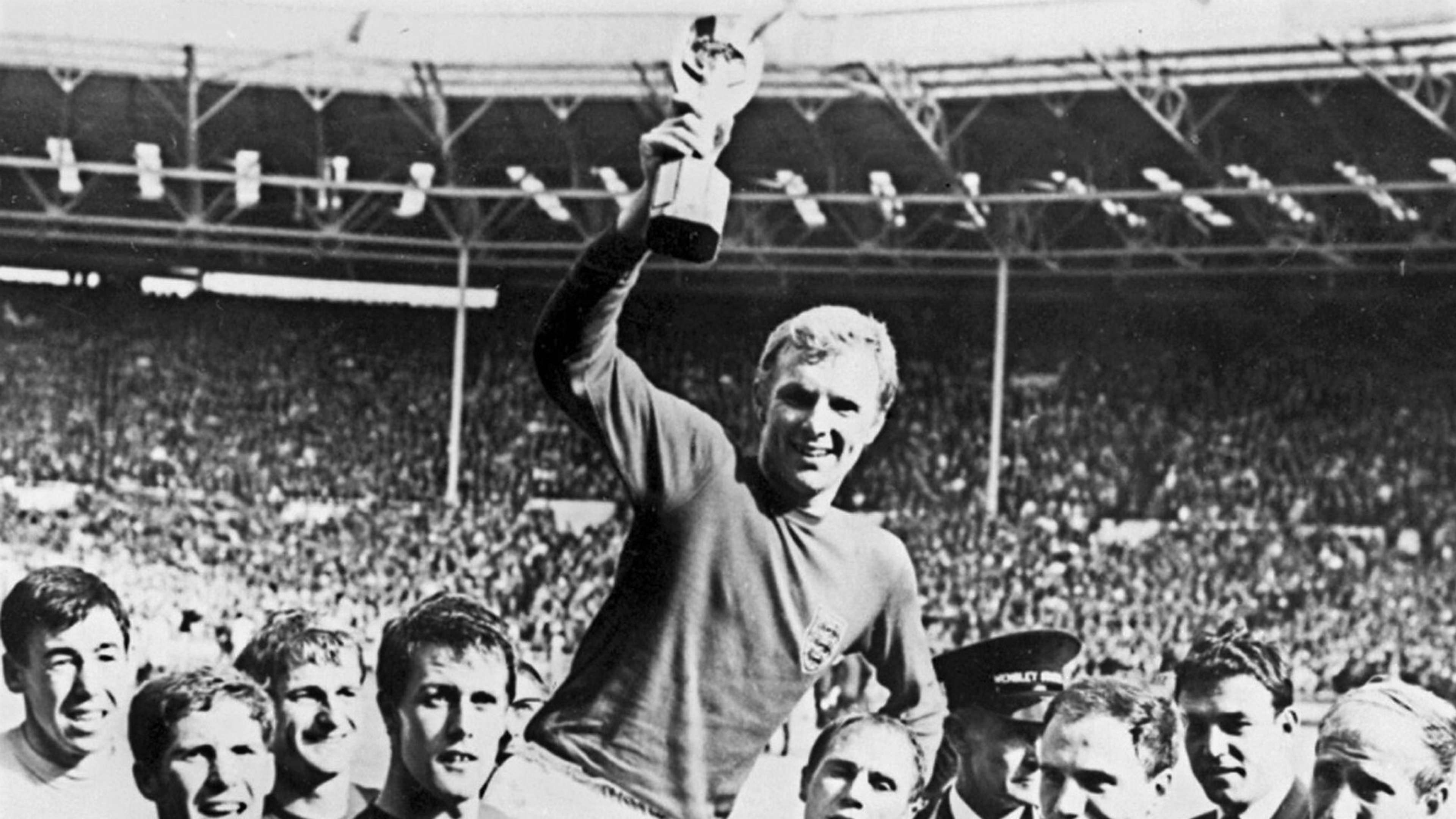
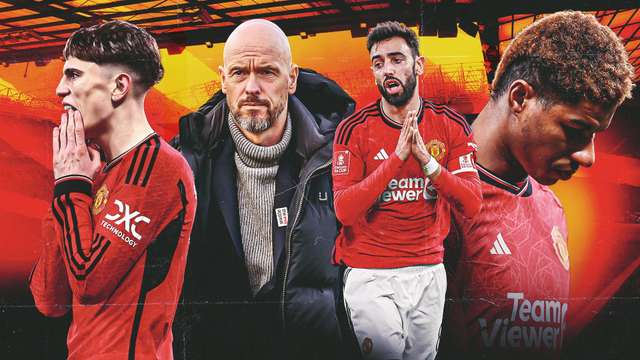
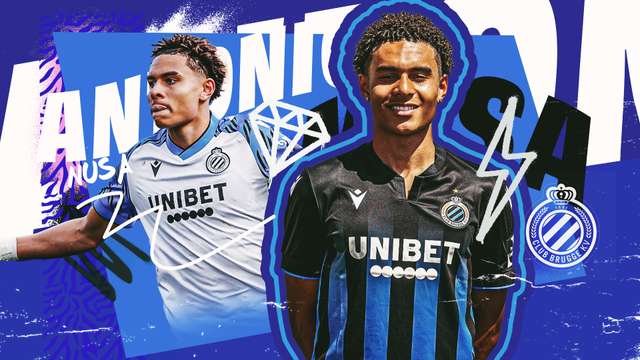
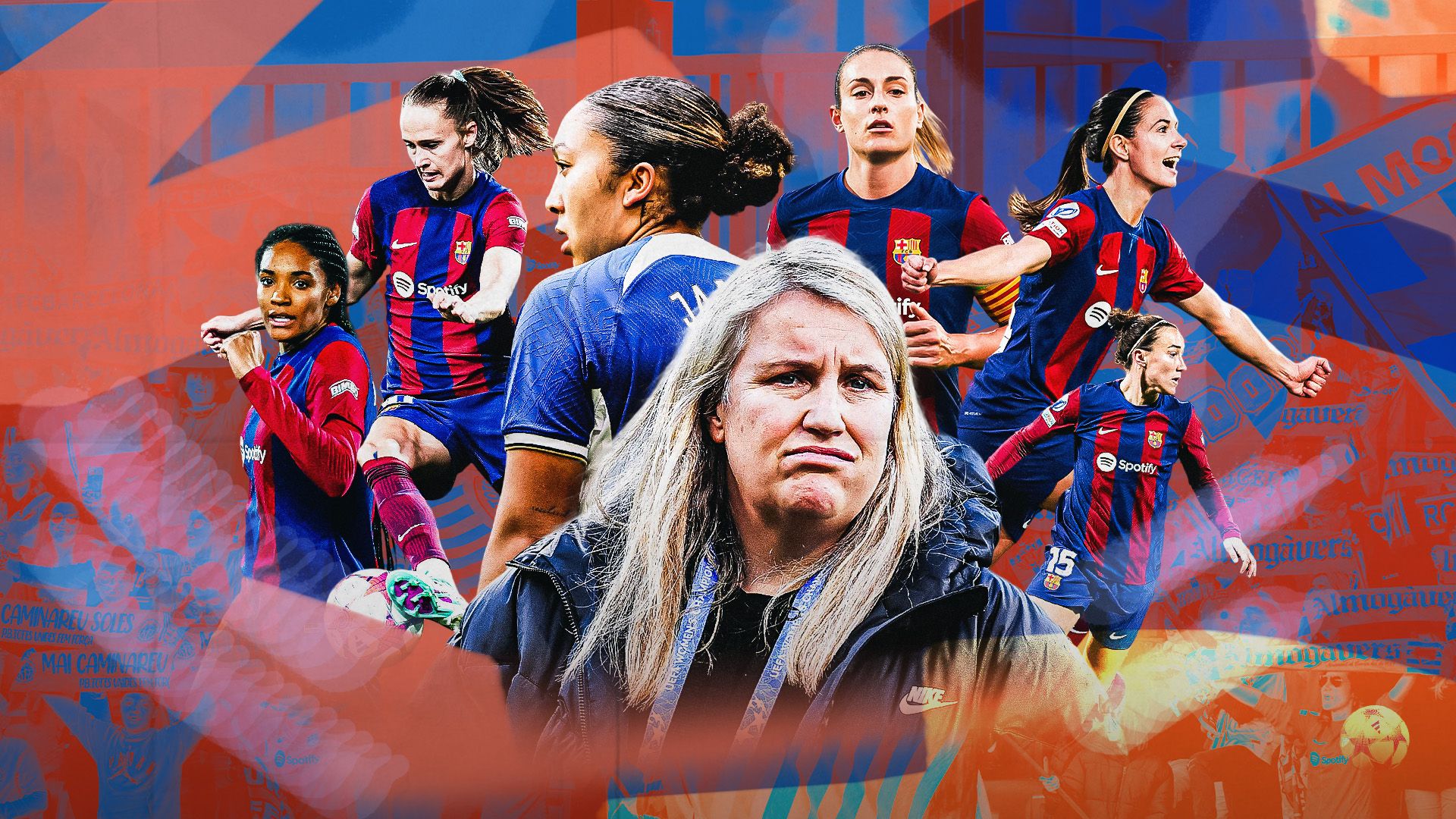.jpg?auto=webp&format=pjpg&width=640&quality=60)
.jpg?auto=webp&format=pjpg&width=640&quality=60)